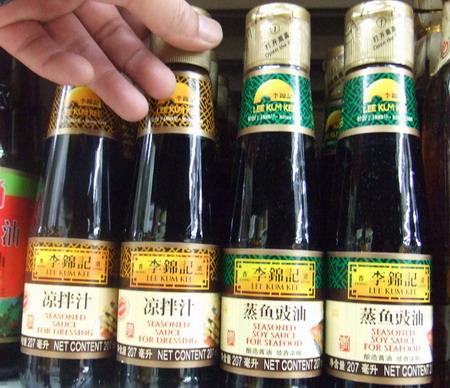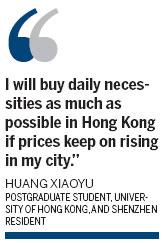
A mainland customer buys bottled Lee Kum Kee soy sauce at a shop in Hong Kong. Prices there are much cheaper than on the Chinese mainland. [Photo / China Daily]
SHENZHEN - After finishing class on Friday afternoon, Huang Xiaoyu, a postgraduate student at the University of Hong Kong, headed straight for the Sha Tin shopping mall, 40 minutes from his home."My mother asked me to buy some food and flavorings to help prepare our family party during the New Year holiday," said Huang.
Huang is from Shenzhen and has been studying in Hong Kong for more than a year.
"I have begun to buy some daily necessities in Hong Kong and I take them to Shenzhen every weekend because the price of the same products in Hong Kong has become much lower than in my city this year," he said.
Hong Kong, a globally-acknowledged shopping paradise, which used to attract people because of the relatively low price of luxury goods, has now become many Shenzhen people's favorite place to buy daily necessities as consumer prices on the Chinese mainland continually rise.

According to Huang, bottles of Hong Kong-produced flavorings made by Lee Kum Kee cost HK$6.96 ($0.89), whereas the price in Shenzhen is 20 yuan ($3), nearly four times more. Housewives in Shenzhen can buy two apples for 10 yuan but HK$10 gets you four in Hong Kong.
"I have begun to learn Mandarin recently to provide a better service for Shenzhen housewives," Chen Shuhui, a 55-year-old sales clerk at the Sha Tin shopping mall, said. Sha Tin is a suburb in which most residents are native-born Hong Kong people.
"We could not speak Mandarin before because there are not as many people from the mainland here as in Tsim Sha Tsui and Causeway Bay," Chen added.
Nowadays Chen says she hears Mandarin being spoken most days while Cantonese has become sidelined, as more and more people come here to buy daily necessities.
To lure more mainland customers, the shopping mall has launched specific promotional activities. Huang said if he buys goods worth more than 800 yuan it covers the cost of a return ticket to Shenzhen.
"I will buy daily necessities as much as possible in Hong Kong if prices keep on rising in my city," said Huang.
Zhang Ying, a young mother in Shenzhen, bought six cans of powdered milk on the Sino-British street on the border between Shenzhen and Hong Kong.
"If I buy infant milk for my baby in Hong Kong I could save more than 200 yuan each time because the exchange rate of Hong Kong dollars against renminbi is constantly declining," Zhang said.
The exchange rate is another reason for Shenzhen housewives' enthusiasm for buying daily necessities in Hong Kong.
According to the Shenzhen Commerce and Industry Bureau, the flow of visitors to the Sino-British Street rose from 1,500 to 3,000 people every day in November. During the weekends visitors often exceed 10,000 people a day.
As the renminbi gradually rises in value against the US dollar, the Hong Kong dollar, which is pegged to its American namesake, will inevitably decrease in value against the yuan, enabling Chinese mainland people to buy more goods in Hong Kong for the same amount of money.
"It's a natural tendency for Shenzhen residents to buy daily necessities in Hong Kong when they feel the effect of rising consumer prices locally," said Song Ding, director at the tourism department of the Shenzhen-based China Development Institute.
Pei Liang, secretary-general at the China Chain Store and Franchise Association, said the loss of customers would bring more pressure on retailers in Beijing, Shanghai and Shenzhen, who have already suffered from increasing consumer prices and fierce market competition.
"To maintain normal operations, they should enhance their service and maintain a high cost-effectiveness to balance the benefits of manufacturers, customers and themselves," Pei said.
Inflation has been a hot topic for the man in the street, experts and policymakers alike this year. A senior member of an influential government think-tank said earlier this month that China's inflation could rise to nearly 6 percent during the first quarter of next year.




